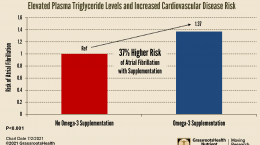Published on June 9, 2024
An explanation of findings from a recent study on omega-3 supplements and heart health
Key Points
- A recent study found 5 positive associations between fish oil supplementation and heart health outcomes, yet only the unfavorable association was emphasized, especially by the media
- Additional research shows favorable relationships between fish oil supplementation and omega-3 levels and positive clinical outcomes, including a lower risk for afib
- The following video features Dr. Bill Harris, a top omega-3 researcher worldwide who has been studying omega-3s for over 40 years, as he reviews the study in detail along with several issues found in the paper
 A recent study by Chen et al. on fish oil supplementation and heart health has received a lot of negative media attention, with headlines such as:
A recent study by Chen et al. on fish oil supplementation and heart health has received a lot of negative media attention, with headlines such as:
“Fish Oil Supplements May Raise Your Risk of Heart Disease and Stroke if You’re Healthy”
“Fish oil supplements may raise risk of stroke, heart issues, study suggests”
“Regular use of fish oil supplements may increase first time heart disease and stroke risk”
While this study found 5 positive associations between fish oil supplementation and heart health outcomes, only the unfavorable association was emphasized, especially by the media. The following video hosted by OmegaQuant titled “Going Behind the Headlines” features Dr. Bill Harris as he reviews the study in detail along with several issues found in the paper.
“Dr. Bill Harris of the non-profit Fatty Acid Research Institute (FARI) has been studying omega-3 fatty acids (the nutrients found in fish oil) for more than 40 years and is considered to be among the top 2% of scientists worldwide based on the impact of his research. Only 1 of his research papers was cited in this most recent BMJ study even though he has published more than 350 papers on omega-3 fatty acids specifically, many of which on fish oil supplements and their relationship with heart health… He believes setting the record straight in light of this new research is a matter of public health.”
Watch the Video
Video Summary
The Chen et al. study looked at data from individuals who reported the use of fish oil supplements, based on a Yes or No question asking if they were taking fish oil supplements
The amount taken was not included, nor were omega-3 blood levels
The authors looked at different outcomes among those who used fish oil supplements
Several significant associations they found included:
- An increased risk of atrial fibrillation (afib) among participants who were healthy at baseline (very small increase)
- A decreased risk of afib progressing to major adverse cardiovascular events (MACE)
- A decreased risk of heart failure developing among those who were healthy at baseline
- A decreased risk of afib progressing to death
- A decreased risk of heart failure progressing to death
- A decreased risk of afib progressing to heart attack
Another study conducted using the UK Biobank data by Li et al. found that those taking fish oil supplements had a
- 13% decreased risk of all-cause mortality
- 16% decreased risk of cardiovascular mortality
- 20% decreased risk of death from heart attack
- 7% decreased risk of cardiovascular event
- 8% decreased risk of heart attack
- 10% decreased risk of stroke
This paper was not mentioned by Chen et al…
Dr. Harris discusses questions about how the data was analyzed
Several other studies looking at fish oil supplement users and different health outcomes have found beneficial effects for heart health
It is far better to compare health outcomes to blood levels of omega-3s rather than omega-3 intake alone
Additional research shows favorable relationships between omega-3 levels and positive clinical outcomes, including a lower risk for afib
5 favorable links with fish oil supplementation were found by Chen et al., yet only the one unfavorable link was emphasized, especially by the media
The media did a huge disservice to public health by misrepresenting the situation…
What Do Your Omega Levels Look Like?
Should you be taking steps to increase your omega-3 intake and/or decrease your omega-6 intake? Testing your Omega-3 Index along with your ratios can help you determine if you are getting the right amount of each and what steps to take to improve your levels.
The omega-6 to omega-3 (Omega-6:3) ratio is one of the measurements received for any participant who adds the “Ratios” to their Omega-3 Index test. Both the AA:EPA ratio and Omega-6:3 ratio are measures of pro/anti-inflammatory fatty acids; knowing these ratios can help individuals take more specific steps towards improving fatty acid status and achieving lower levels of inflammation through diet and supplements.
Create Your Custom Home Test Kit
 Measure your vitamin D levels at home as part of the D*action project! To know if you are getting enough, make sure you test today!
Measure your vitamin D levels at home as part of the D*action project! To know if you are getting enough, make sure you test today!
You can also measure your:
- Vitamin D
- Magnesium PLUS Essential and Toxic Elements
- Omega-3 Fatty Acids
- hsCRP
- HbA1c
- TSH
- Type 1 Diabetes Autoantibodies
Did you know that each of the above can be measured at home using a simple blood spot test? As part of our ongoing research project, you can order your home blood spot test kit to get your levels, followed by education and steps to take to help you reach your optimal target levels. Start by enrolling and ordering your kit to measure each of the above important markers, and make sure you are getting enough of each to support better mood and wellbeing!
Create your custom home test kit today. Take steps to improve the status of each of these measurements to benefit your overall health. With measurement you can then determine how much is needed and steps to achieve your goals. You can also track your own intakes, symptoms and results to see what works best for YOU.






